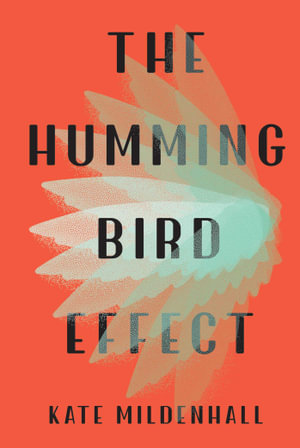The hummingbird effect by Kate Mildenhall

Described as a ‘genre-bending novel’, The hummingbird effect presents four stories from different time periods, and only towards the end do we begin to make the connections. There are Lil and Peggy working at the Footscray meatworks in 1933, Hilda confined to aged care during Covid in 2020, La working in the WANT warehouse in 2031, and sisters Maz and Onyx collecting the pieces in a 2181 post-apocalyptic world. In between chapters, there is a conversation with an AI robot about what human innovations would need to be uninvented to ensure a better world. And then there is ‘Before Now Next’, a repeated poetic section that describes the continuous flow of the river of life.
There are themes that connect the four scenarios. In each there is the issue of exploitation of workers, the growth of capitalism and the dehumanising and relentless pressure to achieve more, in the meatworks factory, in the aged care home, in the Amazon-like warehouse, and even in the ‘Stewardship’ teams of the future. And in each time period, it is women who connect together to help and care for each other.
I found one of the most powerful scenes to be the brooding violence in Peggy and Jack’s relationship, that at any time the angry red cloud could envelop him, and his fury become uncontainable. Mildenhall’s writing puts you right in the scene and you feel Peggy’s anxiety and terror. For others, scenes that will resonate strongly will most likely be the containment of the Covid era, the isolation and loneliness. And then in the WANT warehouse, as in the factory, there is the oppressive workplace demands to continually up targets and outperform. There are so many situations in this book that people will readily identify with, not least being the sense of impending world disaster, a wish to turn back the climate change clock.
The ‘hummingbird effect’ is about events triggering other outcomes in wholly different fields. The AI discussions reveal how each innovation has positive and negative implications, and it is impossible to single out one responsible factor from the complex web of interactions that might lead to the end of the world. The suggestion is that the worst mistake is actually the human race itself.
This may all sound negative, but the uplifting aspect of the 2181 scenario is the friendship and support between the two sisters Maz and Onyx, the fellowship with other caring women, and the feeling of optimism when women work together. All in all, The hummingbird effect would be an excellent book club choice for thought-provoking discussion.
Themes: Women, Future, Workers, Artificial intelligence, End of the world, Domestic violence, LGBQTI+.
Helen Eddy